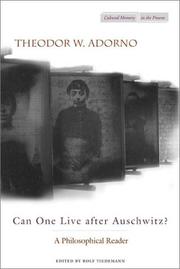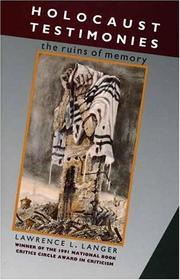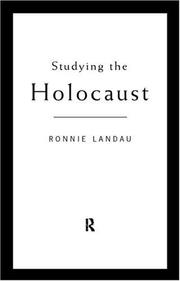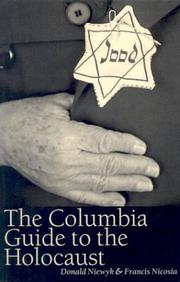| Listing 1 - 10 of 457 | << page >> |
Sort by
|
Periodical
ISSN: 23256257 Year: 2009 Publisher: Haifa : Abingdon, Oxfordshire, UK : Institute for Holocaust Research, University of Haifa, The Ghetto Fighters' House Museum, Taylor & Francis
Abstract | Keywords | Export | Availability | Bookmark
 Loading...
Loading...Choose an application
- Reference Manager
- EndNote
- RefWorks (Direct export to RefWorks)
Holocaust, Jewish (1939-1945) --- 1939-1945 --- Catastrophe, Jewish (1939-1945) --- Destruction of the Jews (1939-1945) --- Extermination, Jewish (1939-1945) --- Ḥurban (1939-1945) --- Ḥurbn (1939-1945) --- Jewish Catastrophe (1939-1945) --- Jewish Holocaust (1939-1945) --- Holocaust, Nazi --- Nazi Holocaust --- Shoʼah (1939-1945) --- World War II Period --- World War (1939-1945)
Book
ISBN: 0953169650 Year: 2000 Publisher: London Institute of Art and Law
Abstract | Keywords | Export | Availability | Bookmark
 Loading...
Loading...Choose an application
- Reference Manager
- EndNote
- RefWorks (Direct export to RefWorks)
Art treasures in war --- Holocaust, Jewish (1939-1945) --- Jews --- Catastrophe, Jewish (1939-1945) --- Destruction of the Jews (1939-1945) --- Extermination, Jewish (1939-1945) --- Holocaust, Nazi --- Ḥurban (1939-1945) --- Ḥurbn (1939-1945) --- Jewish Catastrophe (1939-1945) --- Jewish Holocaust (1939-1945) --- Nazi Holocaust --- Nazi persecution of Jews --- Shoʾah (1939-1945) --- Reparations --- Claims --- Nazi persecution --- Genocide --- World War, 1939-1945 --- Kindertransports (Rescue operations) --- Art and war --- Persecutions --- Atrocities --- Jewish resistance --- Holocaust, Nazi (Jewish Holocaust) --- Nazi Holocaust (Jewish Holocaust) --- Nazi persecution (1939-1945)
Book
ISBN: 0002163055 Year: 1986 Publisher: Glasgow Collins
Abstract | Keywords | Export | Availability | Bookmark
 Loading...
Loading...Choose an application
- Reference Manager
- EndNote
- RefWorks (Direct export to RefWorks)
Holocaust, Jewish (1939-1945) --- Holocauste, 1939-1945 --- Catastrophe, Jewish (1939-1945) --- Destruction of the Jews (1939-1945) --- Extermination, Jewish (1939-1945) --- Holocaust, Nazi --- Ḥurban (1939-1945) --- Ḥurbn (1939-1945) --- Jewish Catastrophe (1939-1945) --- Jewish Holocaust (1939-1945) --- Jews --- Nazi Holocaust --- Nazi persecution of Jews --- Shoʾah (1939-1945) --- Genocide --- World War, 1939-1945 --- Kindertransports (Rescue operations) --- Nazi persecution --- Persecutions --- Atrocities --- Jewish resistance --- Holocaust, Nazi (Jewish Holocaust) --- Nazi Holocaust (Jewish Holocaust) --- Nazi persecution (1939-1945)
Book
ISSN: 21022801 ISBN: 9782355260315 2355260311 Year: 2009 Volume: 3 Publisher: Paris Nouvelles Editions Lignes
Abstract | Keywords | Export | Availability | Bookmark
 Loading...
Loading...Choose an application
- Reference Manager
- EndNote
- RefWorks (Direct export to RefWorks)
La singularité du crime nazi dans l'Histoire est aujourd'hui connue sous le nom d' "Auschwitz". Mais qu'en est-il exactement de cette singularité, qu'en est-il de la pensée de cette singularité ? Le propos de cet ouvrage est d'interroger des textes théoriques contemporains - philosophiques (Philippe Lacoue-Labarthe et Alain Badiou, mais aussi Martin Heidegger et Hannah Arendt), mathématiques (Jean-Yves Girard), psychanalytiques (Daniel Sibony), idéologiques ou antiphilosophiques (Eric Marty, Alain Finkielkraut, Jean-Claude Milner) - dans lesquels est abordée la question de la singularité d' "Auschwitz"
Holocaust, Jewish (1939-1945) --- Holocauste, 1939-1945 --- Philosophy. --- Philosophie --- Philosophy --- Genocide --- Catastrophe, Jewish (1939-1945) --- Destruction of the Jews (1939-1945) --- Extermination, Jewish (1939-1945) --- Holocaust, Nazi --- Ḥurban (1939-1945) --- Ḥurbn (1939-1945) --- Jewish Catastrophe (1939-1945) --- Jewish Holocaust (1939-1945) --- Jews --- Nazi Holocaust --- Nazi persecution of Jews --- Shoʾah (1939-1945) --- World War, 1939-1945 --- Kindertransports (Rescue operations) --- Nazi persecution --- Persecutions --- Atrocities --- Jewish resistance --- Holocaust, Nazi (Jewish Holocaust) --- Nazi Holocaust (Jewish Holocaust) --- Nazi persecution (1939-1945) --- Holocaust, Jewish (1939-1945) - Philosophy
Book
ISBN: 2246396115 Year: 1987 Publisher: Paris Grasset
Abstract | Keywords | Export | Availability | Bookmark
 Loading...
Loading...Choose an application
- Reference Manager
- EndNote
- RefWorks (Direct export to RefWorks)
Holocaust, Jewish (1939-1945) --- Catastrophe, Jewish (1939-1945) --- Destruction of the Jews (1939-1945) --- Extermination, Jewish (1939-1945) --- Holocaust, Nazi --- Ḥurban (1939-1945) --- Ḥurbn (1939-1945) --- Jewish Catastrophe (1939-1945) --- Jewish Holocaust (1939-1945) --- Jews --- Nazi Holocaust --- Nazi persecution of Jews --- Shoʾah (1939-1945) --- Nazi persecution --- Genocide --- World War, 1939-1945 --- Kindertransports (Rescue operations) --- Persecutions --- Atrocities --- Jewish resistance --- Holocaust, Nazi (Jewish Holocaust) --- Nazi Holocaust (Jewish Holocaust) --- Nazi persecution (1939-1945)

ISBN: 0804731446 0804731438 Year: 2003 Publisher: Stanford (Calif.) Stanford university press
Abstract | Keywords | Export | Availability | Bookmark
 Loading...
Loading...Choose an application
- Reference Manager
- EndNote
- RefWorks (Direct export to RefWorks)
This is a comprehensive collection of readings from the work of Theodor Adorno, one of the most influential German thinkers of the twentieth century. What took place in Auschwitz revokes what Adorno termed the & Western legacy of positivity,& the innermost substance of traditional philosophy. The prime task of philosophy then remains to reflect on its own failure, its own complicity in such events. Yet in linking the question of philosophy to historical occurrence, Adorno seems not to have abandoned his paradoxical, life-long hope that philosophy might not be entirely closed to the idea of redemption. He prepares for an altogether different praxis, one no longer conceived in traditionally Marxist terms but rather to be gleaned from & metaphysical experience.& In this collection, Adorno's literary executor has assembled the definitive introduction to his thinking. Its five sections anatomize the range of Adorno's concerns: & Toward a New Categorical Imperative,& & Damaged Life,& & Administered World, Reified Thought,& & Art, Memory of Suffering,& and & A Philosophy That Keeps Itself Alive.& A substantial number of Adorno's writings included appear here in English for the first time. This collection comes with an eloquent introduction from Rolf Tiedemann, the literary executor of Adorno's work.
Holocaust, Jewish (1939-1945) --- Philosophy. --- Holocaust, Jewish (1939-1945). --- Philosophy --- Mental philosophy --- Humanities --- Catastrophe, Jewish (1939-1945) --- Destruction of the Jews (1939-1945) --- Extermination, Jewish (1939-1945) --- Holocaust, Nazi --- Ḥurban (1939-1945) --- Ḥurbn (1939-1945) --- Jewish Catastrophe (1939-1945) --- Jewish Holocaust (1939-1945) --- Jews --- Nazi Holocaust --- Nazi persecution of Jews --- Shoʾah (1939-1945) --- Genocide --- World War, 1939-1945 --- Kindertransports (Rescue operations) --- Nazi persecution --- Persecutions --- Atrocities --- Jewish resistance --- Holocaust, Nazi (Jewish Holocaust) --- Nazi Holocaust (Jewish Holocaust) --- Nazi persecution (1939-1945)

ISBN: 0300049668 0300052472 Year: 1991 Publisher: New Haven (Conn.): Yale university
Abstract | Keywords | Export | Availability | Bookmark
 Loading...
Loading...Choose an application
- Reference Manager
- EndNote
- RefWorks (Direct export to RefWorks)
Holocaust survivors --- -Holocaust, Jewish (1939-1945) --- -Survivors, Holocaust --- Victims --- Psychology --- Personal narratives --- Holocaust, Jewish (1939-1945) --- Psychology. --- History and criticism. --- -Psychology --- Catastrophe, Jewish (1939-1945) --- Destruction of the Jews (1939-1945) --- Extermination, Jewish (1939-1945) --- Holocaust, Nazi --- Ḥurban (1939-1945) --- Ḥurbn (1939-1945) --- Jewish Catastrophe (1939-1945) --- Jewish Holocaust (1939-1945) --- Jews --- Nazi Holocaust --- Nazi persecution of Jews --- Shoʾah (1939-1945) --- Genocide --- World War, 1939-1945 --- Kindertransports (Rescue operations) --- Personal narratives&delete& --- History and criticism --- Nazi persecution --- Persecutions --- Atrocities --- Jewish resistance
Book
ISBN: 055312191X Year: 1978 Volume: *1 Publisher: Toronto ; New York ; London Bantam Books
Abstract | Keywords | Export | Availability | Bookmark
 Loading...
Loading...Choose an application
- Reference Manager
- EndNote
- RefWorks (Direct export to RefWorks)
Holocaust, Jewish (1939-1945) --- Holocauste, 1939-1945 --- Catastrophe, Jewish (1939-1945) --- Destruction of the Jews (1939-1945) --- Extermination, Jewish (1939-1945) --- Holocaust, Nazi --- Ḥurban (1939-1945) --- Ḥurbn (1939-1945) --- Jewish Catastrophe (1939-1945) --- Jewish Holocaust (1939-1945) --- Jews --- Nazi Holocaust --- Nazi persecution of Jews --- Shoʾah (1939-1945) --- Genocide --- World War, 1939-1945 --- Kindertransports (Rescue operations) --- Nazi persecution --- Persecutions --- Atrocities --- Jewish resistance --- Holocaust [Jewish ] (1939-1945) --- Addresses, essays, lectures --- Holocaust, Nazi (Jewish Holocaust) --- Nazi Holocaust (Jewish Holocaust) --- Nazi persecution (1939-1945)

ISBN: 0415161444 Year: 1998 Publisher: London Routledge
Abstract | Keywords | Export | Availability | Bookmark
 Loading...
Loading...Choose an application
- Reference Manager
- EndNote
- RefWorks (Direct export to RefWorks)
Examines the historical, philosophical, and moral issues related to the Holocaust. Includes source documents, case studies, a chronology, and more.
Holocaust, Jewish (1939-1945). --- Lerarenopleiding --- (vak)didactiek menswetenschappen. --- Holocaust, Jewish (1939-1945) --- Catastrophe, Jewish (1939-1945) --- Destruction of the Jews (1939-1945) --- Extermination, Jewish (1939-1945) --- Holocaust, Nazi --- Ḥurban (1939-1945) --- Ḥurbn (1939-1945) --- Jewish Catastrophe (1939-1945) --- Jewish Holocaust (1939-1945) --- Jews --- Nazi Holocaust --- Nazi persecution of Jews --- Shoʾah (1939-1945) --- Genocide --- World War, 1939-1945 --- Kindertransports (Rescue operations) --- Nazi persecution --- Persecutions --- Atrocities --- Jewish resistance --- Holocaust, Nazi (Jewish Holocaust) --- Nazi Holocaust (Jewish Holocaust) --- Nazi persecution (1939-1945)

ISBN: 0231112017 0231112009 0231505906 0231528787 Year: 2000 Publisher: New York : Columbia University Press,
Abstract | Keywords | Export | Availability | Bookmark
 Loading...
Loading...Choose an application
- Reference Manager
- EndNote
- RefWorks (Direct export to RefWorks)
Offering a multidimensional approach to one of the most important episodes of the twentieth century, The Columbia Guide to the Holocaust offers readers and researchers a general history of the Holocaust while delving into the core issues and debates in the study of the Holocaust today. Each of the book's five distinct parts stands on its own as valuable research aids; together, they constitute an integrated whole. Part I provides a narrative overview of the Holocaust, placing it within the larger context of Nazi Germany and World War II. Part II examines eight critical issues or controversies in the study of the Holocaust, including the following questions: Were the Jews the sole targets of Nazi genocide, or must other groups, such as homosexuals, the handicapped, Gypsies, and political dissenters, also be included? What are the historical roots of the Holocaust? How and why did the "Final Solution" come about? Why did bystanders extend or withhold aid? Part III consists of a concise chronology of major events and developments that took place surrounding the Holocaust, including the armistice ending World War I, the opening of the first major concentration camp at Dachau, Germany's invasion of Poland, the failed assassination attempt against Hitler, and the formation of Israel.Part IV contains short descriptive articles on more than two hundred key people, places, terms, and institutions central to a thorough understanding of the Holocaust. Entries include Adolf Eichmann, Anne Frank, the Warsaw Ghetto, Aryanization, the SS, Kristallnacht, and the Catholic Church. Part V presents an annotated guide to the best print, video, electronic, and institutional resources in English for further study.Armed with the tools contained in this volume, students or researchers investigating this vast and complicated topic will gain an informed understanding of one of the greatest tragedies in world history.
Holocaust, Jewish (1939-1945) --- Catastrophe, Jewish (1939-1945) --- Destruction of the Jews (1939-1945) --- Extermination, Jewish (1939-1945) --- Holocaust, Nazi --- Ḥurban (1939-1945) --- Ḥurbn (1939-1945) --- Jewish Catastrophe (1939-1945) --- Jewish Holocaust (1939-1945) --- Jews --- Nazi Holocaust --- Nazi persecution of Jews --- Shoʾah (1939-1945) --- Genocide --- World War, 1939-1945 --- Kindertransports (Rescue operations) --- Nazi persecution --- Persecutions --- Atrocities --- Jewish resistance --- Holocauste, 1939-1945 --- Encyclopedias --- Bibliography --- Encyclopédies --- Bibliographie --- Encyclopedias. --- Holocaust, Nazi (Jewish Holocaust) --- Nazi Holocaust (Jewish Holocaust) --- Nazi persecution (1939-1945)
| Listing 1 - 10 of 457 | << page >> |
Sort by
|

 Search
Search Feedback
Feedback About
About Help
Help News
News